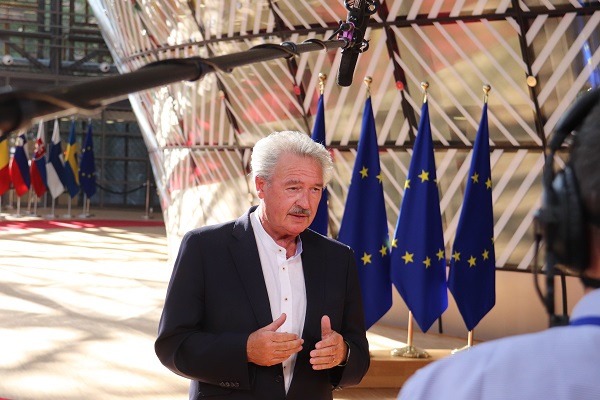 Jean Asselborn, Luxembourg's Minister of Foreign and European Affairs;
Credit: MAEE
Jean Asselborn, Luxembourg's Minister of Foreign and European Affairs;
Credit: MAEE
On Monday 13 July 2020, Luxembourg's Minister of Foreign and European Affairs, Jean Asselborn, participated in the meeting of the Foreign Affairs Council of the European Union in Brussels.
The Council began its session with topical issues, which allowed the ministers to review recent international developments. The participants notably discussed the situation in Libya, the Middle East peace process, EU-Africa relations and the post-Cotonou negotiations, as well as the current situation in Hong Kong and Venezuela.
In this context and faced with the risks posed by a possible annexation by Israel of part of the occupied Palestinian territories, Minister Jean Asselborn declared himself in favour of the rapid preparation of an "options document" which would allow the EU and its member states to reflect on the various measures that could be taken in the event of annexation. He added: "I remain convinced that we must also consider the option of recognition of the State of Palestine by a group of member states".
Subsequently, the ministers discussed the current situation and the impact of the COVID-19 pandemic on the countries of Latin America and the Caribbean. Luxembourg's Foreign Minister stressed the importance of supporting the region and partner countries in this unprecedented health crisis. For its part, the Grand Duchy has reallocated part of its funds to strengthen the health systems of the countries affected and is providing technical assistance to the Regional Contingency Plan of the Central American Integration System (SICA) in the fight against COVID- 19. In addition, Luxembourg renewed its support for the United Nations World Food Programme (WFP) school canteen project for vulnerable children in Nicaragua and also recently announced new contributions in the context of the migration crisis in Venezuela.
The Foreign Affairs Council meeting also provided an opportunity for an in-depth exchange of views on the EU's relations with Turkey. The objective of this discussion was to have a global, strategic and forward-looking debate with the aim of identifying together the means of encouraging Turkey to engage constructively and ultimately to reverse the dynamics of a growing confrontation.
"We urgently need to put an end to the current and unprecedented downward spiral of EU-Turkey relations," commented Minister Jean Asselborn, noting that Turkey is "a difficult but indispensable partner".
Regarding the situation in the eastern Mediterranean, Minister Jean Asselborn reiterated Luxembourg's support for Cyprus and Greece. As for bilateral cooperation, particularly in the area of migration, he recalled the merits of the 2016 EU-Turkey agreement on refugees, which "has proven itself and must be preserved".
Regarding the rapprochement of Turkey with the EU, the Minister stressed that we are at an impasse. In this regard, he said he was "particularly concerned about the recent sentencing to prison terms of four defendants in the Büyükada case against a group of human rights defenders".
The ministers also addressed questions related to foreign and security policy, in particular with regard to Libya and Syria. Minister Jean Asselborn said: “Turkey is a key player in the Syrian and Libyan crises. It plays an important role as a host country for Syrian refugees. Our common interest must be to put an end to violence, to defeat terrorism and to promote stability in Syria, in Libya and in the region as a whole".
The Council recently adopted conclusions relating to the priorities of the EU at the next session of the General Assembly of the United Nations, as well as conclusions relating to co-operation with the Council of Europe for the period 2020- 22.








